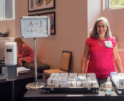
Eva Chen – CEO & Co-founder of Trend Micro

This $1 billion entrepreneur posed as a secretary to close business in Japan.
By Taylor Mallory
As CEO and co-founder of Trend Micro, a $1 billion antivirus security company, and a usual suspect on top women lists, no one would confuse Eva Chen for a secretary today. But that hasn’t always been the case for the Taiwan-born engineer, who ran her company from Taipei until 1995. “In Asia, specifically in high tech, I was always the only woman in the room,” she tells PINK. “In Japan, I often pretended I was a secretary, or they didn’t know how to talk to me.” Chen giggles as she remembers her harmless manipulation, she tells PINK that during client meetings, she let the decision maker talk to her engineer and assume she was just taking notes. “I was, of course, actually making the decisions and passing notes to the engineer about what to say – ‘yes,’ ‘no,’ ‘we cannot do that.’ I just saved myself the trouble of dealing with men who didn’t know how to work with a woman. I didn’t care. I just made it work.”
In 1995, she moved her family to Silicon Valley, “where the technological innovation happens.” Her biggest cultural challenge during this transition? “It’s actually easier for me to do business here, being a woman. It’s much more open to women in business.”
An industry leader in innovation, Chen served as chief technology officer (CTO) before taking the CEO reigns in 2004. In that role, she’s developing the industry’s first centralized antivirus solutions for gateways, e-mail systems and file servers and has secured five key patents to anchor these unique solutions. And she conceptualized and delivered Network VirusWall, a first-of-its-kind outbreak prevention appliance that protects multiple network segments and servers.
Here she shares her best practices for innovation, leadership (think employee pajama parties) and balance.
PINK: What are your best tips for innovation?
Eva Chen: Challenge assumptions. Experts told me that you can’t do an advertising campaign for brand recognition and lead generation at the same time. I always ask why not. That’s usually where the innovation comes out. We don’t do a lot of advertising, so it should be effective. And it worked! B2B Marketing magazine just used our successful campaign as an example that it can be done.
PINK: What’s your professional success secret?
E.C.: Listening. When I was CTO, I led all the engineers. Often technical leaders insist on always doing things their way and end up competing with the engineers. I always try to understand their position and figure out how to make both of us happy. That’s my management style – you can always find a win/win. Male leaders are often more competitive and think for them to win, the other person has to lose. That’s not true. Understanding what other side wants to do and getting it to work is how I come up with my most innovative solutions. For example, right now in IT, there’s a big debate about security software and whether it should be loaded onto the servers client-side or on the cloud – where it’s hosted by a larger site. In the transition time, some people still want to run it client side. We came up with our Smart Protection Network, so our security software sits on the computer, but virus signatures, which are very big, sit in the cloud hosted by Trend Micro.
PINK: How do you motivate your team?
E.C.: One important thing is keeping everyone on the same page, so everyone understands the new direction of our company. We now have more than 4,000 people in different countries. I have an internal blog where I write about cloud computing and why we’re doing this. And every year we have a pajama party, where everyone gets together and talks about the future of the company. Most of our engineers are in Asia. And the project management and marketing people are in U.S. and Europe. So when they all meet, there’s a time lag, and someone is always in their pajamas. So when we bring them all together, we call it a pajama party. We even give out pairs to everyone. Sometimes you have to bring out the fun and soft side. Engineers usually fight with marketing people. But people are more relaxed when we make it a party, and it’s easier to get everyone in alignment.
PINK: What is the best business advice you’ve ever received?
E.C.: When my brother-in-law handed me the CEO role, the only advice he gave me was to be myself. “You don’t need to pretend you’re the CEO,” he said. “Just be yourself – the best part of yourself.” Whenever I face a decision, personal or business, I always come back to that and think about what I really want and care about most. Only when you are yourself can you make sound decisions, and that is better for your business. I believe that’s an important lesson for women. If we aren’t confident about what we can do, we often try to be like men, and that’s not a good thing. I used to always dress in jeans. I never wore skirts or earrings. But 10 years ago, I started to realize I should be myself. Even though I’m working in a “man’s industry,” I can be myself. I don’t believe any male would do what I did, put aside my ego and pretend to be a secretary to get business done. The strength of being a woman means being able to do things softly sometimes. You don’t have to dominate everything to be a leader, especially if that’s not authentic for you.
PINK: What are your best balance tips?
E.C.: I have two children, ages 19 and 15. I’m married, but my husband works in Taiwan, and the kids live in California with me. My son is in college now, and my daughter is in high school. They grew up along with me making this business. When my son was going primary school, he had to write an article about his mom. He wrote, “My mom is a working woman, and she works at midnight, talking with a lot of guys.” Because of time lag, I always made conference calls at night. (She laughs.) I don’t know what that teacher thought. When the kids were younger, their friends were always at our house. One time a kid found out I was a working woman, and he was very surprised. He told my son that he thought I was a stay-at-home mom, because I was always there. I was really proud of that. Now, I have to travel a lot, but I always come home on the weekends, to spend quality time with my kids. My son likes to cook, so we do that together. My daughter loves dancing and singing, so we go to shows together. And we talk a lot – in person and via SMS and Facebook. It’s not about how much time you spend but how you spend it. If there’s a will, there’s a way. You just need to believe that.
PINK: What do you do to relax and rejuvenate yourself?
E.C.: I do fencing. My goal is to get into a fencing tournament. I also do oil painting. Right now I’m working on impressionist-style paintings based on pictures I took of ballerinas. The three things I really love to do – product design, innovation and painting – are all about putting things together. That’s what I really love. When I’m painting, I could spend a whole day painting and forget about the time. It’s like my meditation. I think you should focus completely on something other than work sometimes. Fencing also requires total focus in that moment.
PINK: As we’re coming out of this recession, how are you growing business?
E.C.: At the beginning of the year, we acquired a company from Canada that protects virtual (or cloud) servers, which move around like mobile computers. Internally, we reorganized around this strategy and founded a division focused solely on cloud computing. We’re coming out with cool technology to allow companies to encrypt data, so they control it more easily. For instance, when you’re on Facebook, and you post a photo, it’s hosted by Facebook. If you want to delete it one day, you can take it off your account, but they can’t guarantee it doesn’t still exist on a server somewhere. If that photo is encrypted so that only you can unlock it, even if they don’t get rid of it, you can ensure that even if someone accessed the photo, they couldn’t see it after you “turn it off.”
PINK: What is one personal goal you haven’t yet achieved?
E.C.: To be an astronaut. I watch space travel programs and hope to sign up when the price comes down a little bit. I’ve experienced zero gravity. You can go on a 747 plane that has been converted with no seats. You lie on the floor while the while the aircraft climbs higher. You feel pressure, like big iron pots pressing down on your chest. Then the plane drops straight down, and for about two minutes, all that heaviness is gone and you float. It’s an amazing experience. A lot of other people on that trip threw up. I didn’t, so I think I passed (she laughs). I did this around the time the economy was starting to crash, and I’ve used it as an example to others internally. This time is like the part where you’re lying on the floor while heaviness presses down on you. But then later on you will experience that beautiful time to just float and fly.
Recommended
-
Spring Sales Are Ready To Bloo...March 1st, 2024
-
Two Months Away!August 24th, 2023
-
Pink’s Signature Spring ...May 17th, 2023
-
One Rx For Employee Community ...April 19th, 2023
-
Contact PINKMarch 3rd, 2023















